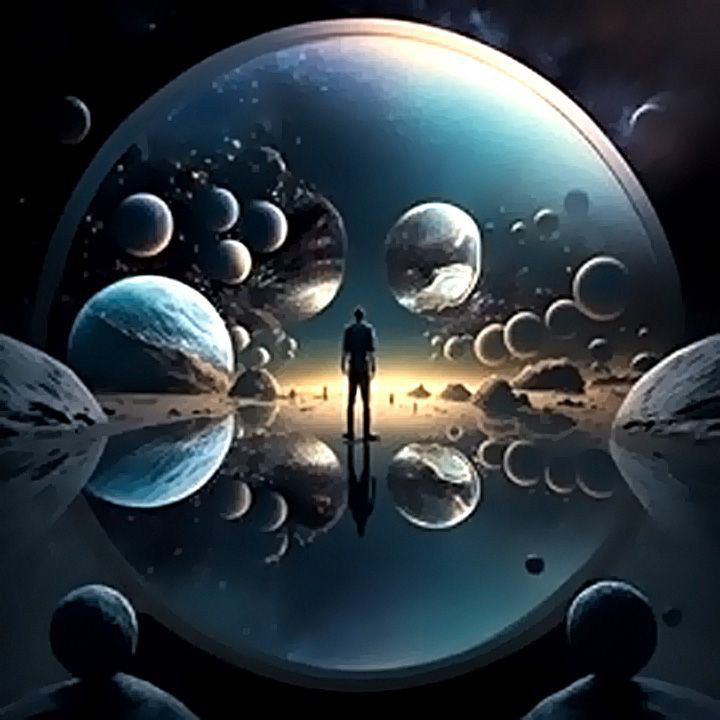समांतर विश्वात, इतिहास, भूगोल आणि खगोलशास्त्र हे आपल्या स्वतःहून बरेच वेगळे असू शकते. हे फरक त्या समांतर विश्वाच्या विशिष्ट स्वरूपावर अवलंबून सूक्ष्म भिन्नतेपासून ते मुख्य भिन्नतांपर्यंत असू शकतात.
**इतिहास:** समांतर विश्वाचा इतिहास आपल्या स्वतःच्या तुलनेत वेगवेगळ्या घटना, निर्णय किंवा व्यक्तींद्वारे आकारला जाऊ शकतो. उदाहरणार्थ, प्रमुख ऐतिहासिक व्यक्ती कदाचित अस्तित्वात नसतील किंवा महत्त्वाच्या घटना वेगळ्या प्रकारे उलगडल्या असतील. यामुळे युद्धे, राजकीय संरचना, तांत्रिक प्रगती आणि सांस्कृतिक घडामोडींमध्ये पर्यायी परिणाम होऊ शकतात.
**भूगोल:** समांतर विश्वाच्या भूगोलामध्ये पृथ्वीच्या तुलनेत भिन्न भूभाग, हवामान आणि नैसर्गिक संसाधने असू शकतात. महाद्वीप वेगळ्या पद्धतीने मांडले जाऊ शकतात, महासागर मोठे किंवा लहान असू शकतात आणि पर्वत, नद्या आणि जंगलांचे वितरण भिन्न असू शकते. हे फरक सभ्यता, व्यापार मार्ग आणि पर्यावरणीय प्रणालींच्या विकासावर प्रभाव टाकू शकतात.
**खगोलशास्त्र:** समांतर विश्वामध्ये, भौतिकशास्त्राचे नियम किंचित किंवा लक्षणीय भिन्न असू शकतात, ज्यामुळे विश्वाच्या संरचनेत बदल होतात. याचा परिणाम ग्रह, चंद्र, तारे आणि आकाशगंगा यांसारख्या विविध खगोलीय पिंडांमध्ये तसेच किरणोत्सर्ग किंवा उर्जेचे पर्यायी प्रकार यासारख्या अद्वितीय घटनांमध्ये होऊ शकतात. हे फरक जीवनाच्या उत्क्रांतीवर, अंतराळ संशोधनाच्या विकासावर आणि त्या समांतर जगाच्या रहिवाशांच्या विश्वाची समज यावर परिणाम करू शकतात.
एकंदरीत, समांतर विश्वाचा इतिहास, भूगोल आणि खगोलशास्त्र हे आपल्या स्वतःच्या विश्वापेक्षा वेगळे असलेल्या घटकांच्या जटिल परस्परसंवादाद्वारे आकारले जाईल, सट्टा अन्वेषण आणि सर्जनशील कथाकथनासाठी एक आकर्षक संधी प्रदान करेल.
In a parallel universe, the history, geography, and astronomy could be vastly different from our own. These differences could range from subtle variations to major divergences, depending on the specific nature of that parallel universe.
**History:** The history of a parallel universe might be shaped by different events, decisions, or individuals compared to our own. For example, major historical figures might not have existed, or pivotal events might have unfolded differently. This could lead to alternate outcomes in wars, political structures, technological advancements, and cultural developments.
**Geography:** The geography of a parallel universe could feature different landmasses, climates, and natural resources compared to Earth. Continents might be arranged differently, oceans could be larger or smaller, and the distribution of mountains, rivers, and forests might vary. These differences could influence the development of civilizations, trade routes, and ecological systems.
**Astronomy:** In a parallel universe, the laws of physics might be slightly or significantly different, leading to variations in the structure of the cosmos. This could result in different celestial bodies, such as planets, moons, stars, and galaxies, as well as unique phenomena like alternate forms of radiation or energy. These differences could impact the evolution of life, the development of space exploration, and the understanding of the universe by inhabitants of that parallel world.
Overall, the history, geography, and astronomy of a parallel universe would be shaped by a complex interplay of factors that are distinct from our own universe, offering a fascinating opportunity for speculative exploration and creative storytelling.
The concept of parallel universes, also known as alternate realities or multiverses, comes from theories in physics and speculative fiction. In physics, the idea is based on the notion that our universe might be just one of many universes that exist alongside each other, each with its own set of physical laws and constants. This concept is often used in theories like the Many-Worlds Interpretation of quantum mechanics, which suggests that every possible outcome of a quantum event actually occurs in a separate universe.
In speculative fiction, parallel universes are a popular theme, often depicted as alternate versions of our own reality where history has unfolded differently or where the laws of nature are altered. These stories explore the idea of "what if" scenarios, imagining how different choices or events could have led to radically different worlds.
The concept of parallel universes raises profound questions about the nature of reality, the structure of the cosmos, and the possibilities for existence beyond our own universe. While it remains speculative and theoretical in physics, it continues to capture the imagination of scientists, philosophers, and storytellers alike.






Comments
Post a Comment